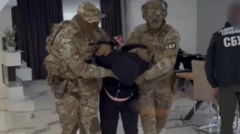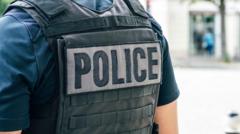A criminal organization named Ares Leaks has begun selling classified documents purportedly from Russia's Federal Security Service, drawing attention to the alarming ease with which sensitive information is trafficked on platforms like Telegram.
Russian Intelligence Documents Offered for Sale by Cybercrime Group

Russian Intelligence Documents Offered for Sale by Cybercrime Group
A glimpse into the dark world of cybercrime reveals how classified Russian intelligence is being commodified online.
On the popular messaging platform Telegram, a growing underworld of cybercriminals has emerged, offering a smorgasbord of stolen governmental documents worldwide. Intelligence briefings from various nations are being auctioned off for various sums—Indonesia’s assessments could cost $5,000, while diplomatic cables from Taiwan are going for $10,000. Even identities associated with Iranian espionage are available for an enticing $3,000.
In November, a criminal group operating under the name Ares Leaks made waves when it advertised for sale classified documents sourced from Russia's Federal Security Service (F.S.B.). While reputable news organizations, such as The New York Times, do not partake in the purchasing of stolen documents, they accept materials provided freely and without conditions; a practice commonly employed by groups like Ares Leaks who often give away sample documents to entice potential buyers.
The sample assortment provided by Ares Leaks included a complete counterintelligence report about China, believed to stem from the operations arm of the F.S.B., known as D.K.R.O. This document shed light on Russia's complex and often enigmatic relations with China, revealing Moscow's growing concerns regarding Chinese spying activities. Additionally, it highlighted a clandestine program devised by Russia to gather and scrutinize data from WeChat, a prevalent Chinese messaging application.
Investigations into the samples indicated they aligned with previously disclosed F.S.B. records, and experienced journalists examining the documents found no immediate indicators of forgery or inconsistencies, raising serious questions regarding national security worldwide.






















